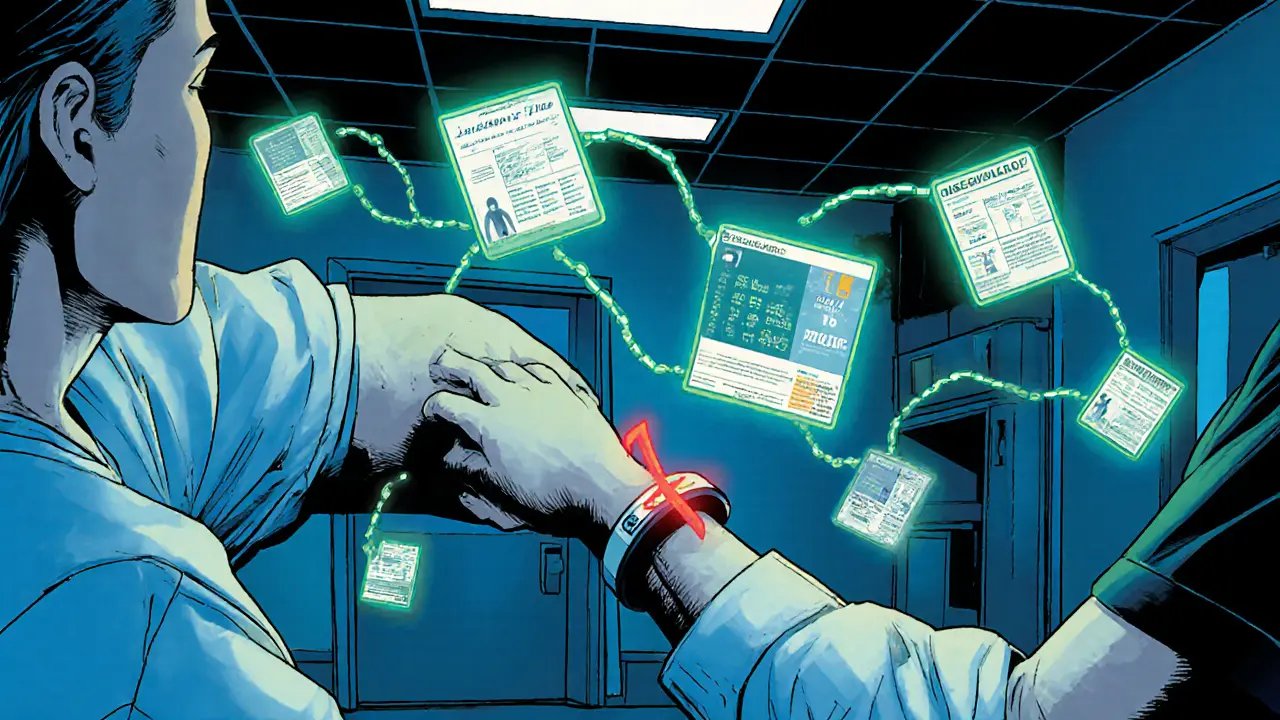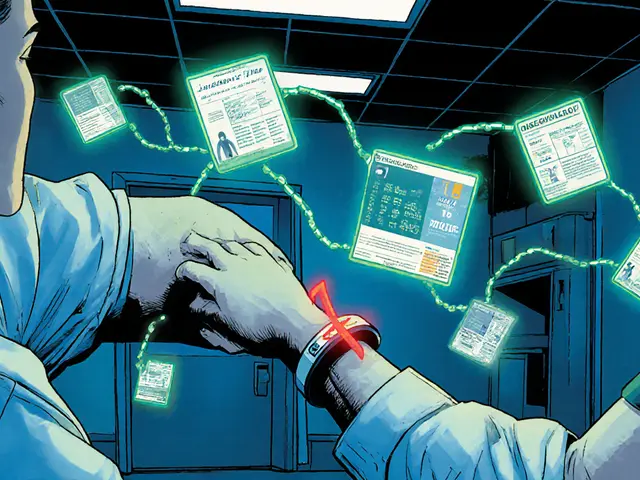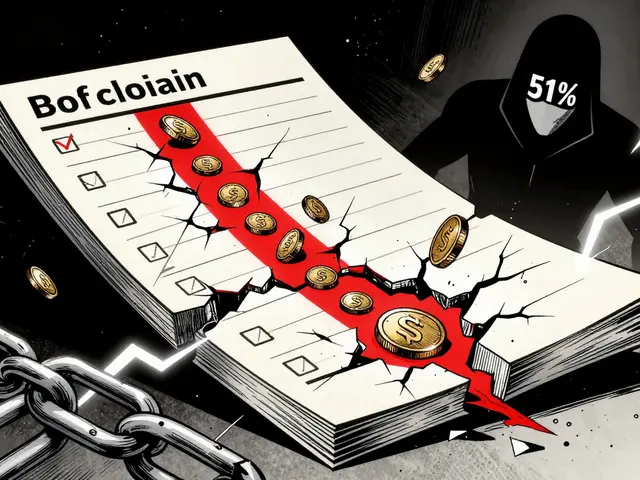Imagine a world where a hospital can prove a patient’s medical history hasn’t been changed - not by a single person, not by a system glitch, but because the data is locked in place by math. That’s blockchain immutability. It’s not just a tech buzzword. It’s the reason some industries are rebuilding their entire systems around it. Once data is written to a blockchain, it can’t be erased, edited, or hidden. Not even by the person who created it. This isn’t about being fancy. It’s about trust when the stakes are life and death, billions of dollars, or your identity.
Healthcare: When Your Medical Records Can’t Be Faked
In healthcare, data errors kill. A wrong dosage, a missed allergy, a forged prescription - these aren’t hypotheticals. They happen every day in centralized systems where records are stored on servers anyone with access can tweak. Blockchain changes that. Patient records, lab results, and medication histories are stored as immutable blocks. Every update is added as a new link in the chain, never overwritten. No one can delete a note saying a patient had a severe reaction to penicillin. No one can slip in a fake diagnosis to cover up a mistake. This isn’t theory. The U.S. Department of Health and Human Services has funded pilot programs using blockchain to track drug supply chains. Counterfeit drugs - a $200 billion global problem - are being stopped at the source. A pill’s journey from manufacturer to pharmacy is recorded on-chain. If someone tries to inject fake insulin into the supply, the blockchain shows the break in the chain. Pharmacies can scan a QR code and see every stop, every temperature log, every handler. No guesswork. No paper trails that get lost.Audit Trails: The Unbreakable Logbook
Think of an audit trail like a security camera for your business. Traditional logs can be edited. System admins can delete entries. Hackers can wipe them clean. Blockchain audit trails? They’re like taking a photo of every action and burying it in a thousand vaults around the world. Once you log that a user accessed a financial system at 3:17 a.m., that timestamp and IP address are fixed forever. In finance, this is non-negotiable. Regulators demand proof of compliance. If a bank is accused of hiding a transaction, the blockchain doesn’t care. It shows exactly what happened. The 2023 SEC report on crypto exchanges found that platforms using blockchain-based audit logs reduced fraud investigations by 68% because the evidence was already there - untouched and undeniable. Even in cybersecurity, this matters. When a breach happens, forensic teams don’t have to reconstruct logs from backups. They just pull the blockchain record. Every login, every file access, every data export is permanently recorded. There’s no "I didn’t do it" defense. The chain doesn’t lie.Supply Chains: From Farm to Fork, No Lies Allowed
You buy a bag of organic spinach. How do you know it’s really organic? That it wasn’t sprayed with banned pesticides? That it didn’t come from a farm that violated labor laws? Traditional supply chains rely on paper receipts, third-party certifications, and trust. Blockchain replaces all of that with code. IBM Food Trust, used by Walmart and Nestlé, tracks food from the field to the shelf. Each step - harvest, washing, packaging, shipping, warehouse storage - gets recorded on-chain. If an E. coli outbreak hits, instead of recalling every bag of spinach from five countries, they pinpoint the exact batch within minutes. That’s not efficiency. That’s saving lives. Luxury goods use the same system. A $10,000 handbag from a French atelier? Its digital twin lives on the blockchain. Every stitch, every leather batch, every courier scan is recorded. If someone tries to sell a fake, the blockchain proves it’s not the same item. Counterfeiters can’t clone the chain. They can only copy the box.
Digital Identity: You Own Your Data, Not a Corporation
Right now, your identity is scattered across banks, government databases, social media, and apps. Each one holds a piece. And each one can be hacked. In 2024, over 400 million personal records were exposed in data breaches. Blockchain flips the script. Self-sovereign identity lets you control your own data. You don’t hand your passport scan to a bank. You give them a cryptographic key that proves you’re you - without revealing your birth date, address, or SSN. Platforms like Civic and Sovrin use blockchain to store identity attestations immutably. When you verify your age to buy alcohol online, the system checks the blockchain record. It doesn’t store your ID. It just confirms: "This person is over 21." No database to hack. No middleman to sell your data. No one can alter your verified identity after it’s recorded. If you’re denied a loan because of a false credit mark, you can prove it was never yours.Intellectual Property: Proof of Creation, Forever
A musician records a song. A writer finishes a novel. A designer creates a logo. Who owns it? In the old world, you file paperwork, wait months, and hope no one copies it. Blockchain makes that instant. The moment you hash your file and record it on-chain, you have a timestamped, unchangeable proof of creation. Artists on platforms like Opulous use blockchain to register music rights. Every time their song is streamed, the blockchain triggers a smart contract to pay them automatically. No label delays. No royalty disputes. The chain records every license, every transfer, every payment. If someone claims they wrote your song, the blockchain says otherwise. The original timestamp can’t be erased.Decentralized Organizations: Rules That Can’t Be Changed
Imagine a company where no CEO can embezzle funds. No board can vote to cut employee benefits. Everything is governed by code written into a blockchain. That’s a DAO - a Decentralized Autonomous Organization. The rules are locked in. To change them, the community votes. And that vote? Immutable. MakerDAO, one of the largest DAOs on Ethereum, manages billions in crypto assets. Its governance proposals - like adjusting interest rates or adding new collateral types - are recorded on-chain. Once approved, they execute automatically. No one can secretly change the rules. No insider trading. No backroom deals. The code is the law. And the law can’t be altered after the fact.
Clinical Trials: No More Faked Data
Clinical trials are the backbone of new medicines. But for decades, data manipulation has been a quiet crisis. Some trials have been found to hide negative results, alter patient outcomes, or delete unfavorable data. Blockchain fixes this. Every measurement - blood pressure, tumor size, patient feedback - is recorded on-chain the moment it’s collected. In trials using blockchain, researchers can’t go back and change a patient’s response. If a drug causes a side effect, it’s there in the record. Regulators like the FDA are starting to accept blockchain-based trial data as valid evidence. This isn’t just about honesty. It’s about speed. When data can’t be tampered with, trials get approved faster. Patients get treatments sooner.Fraud Detection: AI + Immutability = Unstoppable
Fraudsters thrive on hidden data. They delete logs, fake transactions, create ghost accounts. Blockchain doesn’t let them. When paired with AI, it becomes a fraud-fighting powerhouse. AI spots patterns - like a sudden spike in small transfers from a new account. Blockchain confirms: yes, that transaction happened. And yes, it was never altered. Banks in Europe and Australia are testing AI-blockchain systems that flag suspicious activity in real time. Because the ledger is immutable, investigators can trace every step back to the origin. No data gaps. No deleted files. Just a clear, unbroken trail. One bank reported a 73% drop in fraudulent account openings after implementing this system.Why This Matters More Than You Think
Blockchain immutability isn’t about Bitcoin. It’s not about speculation. It’s about building systems where trust doesn’t come from a person, a company, or a government - it comes from math. And math doesn’t lie. When your medical history is safe, when your food is traceable, when your identity is yours alone, when your art is protected - that’s the real value. It’s not about being decentralized for the sake of it. It’s about fixing broken systems that have been failing us for decades. The technology isn’t perfect. Scaling is hard. Energy use is debated. But the core idea - that data, once recorded, should be untouchable - is becoming essential. Industries that ignore it will keep losing money to fraud. They’ll keep facing lawsuits over data breaches. They’ll keep losing customer trust. Those that adopt it? They’re not just keeping up. They’re setting the new standard.Can blockchain data ever be changed?
Technically, yes - but only if you control more than 51% of the network’s computing power, which is nearly impossible on major blockchains like Bitcoin or Ethereum. Even then, it would require massive resources and would be immediately obvious to everyone on the network. In practice, blockchain data is considered permanently unchangeable.
Is blockchain immutability the same as encryption?
No. Encryption hides data so only authorized people can read it. Immutability means once data is written, it can’t be altered - even by someone who can read it. You can encrypt data on a blockchain, but immutability is about integrity, not secrecy.
What happens if I make a mistake in a blockchain record?
You can’t delete or edit it. Instead, you add a new record that corrects the error. For example, if a patient’s blood type was recorded wrong, you add a new entry saying "Correction: Blood type is AB+, original entry was incorrect." The original stays, but the correction is clear and verifiable.
Does blockchain immutability make systems slower?
Yes, sometimes. Writing to a blockchain requires consensus from multiple nodes, which takes more time than updating a single database. But for use cases where data integrity matters more than speed - like auditing, identity, or supply chains - the trade-off is worth it. Newer blockchains like Solana and Polygon are reducing this delay significantly.
Are governments using blockchain immutability?
Yes. Estonia uses blockchain to secure health records and digital identities. Sweden is testing it for land registries. The U.S. Department of Defense has piloted blockchain for supply chain tracking. Governments are adopting it not because it’s trendy, but because it reduces fraud and increases transparency in public systems.
Can blockchain prevent all types of fraud?
No. It prevents fraud related to data tampering - like altering records, faking transactions, or deleting logs. It doesn’t stop phishing, social engineering, or insider threats where someone with access gives away credentials. Blockchain secures the record, not the person entering the data.




Clarice Coelho Marlière Arruda
October 31 2025so like... if i typo my blood type on chain, i’m stuck with it forever? 😅
Sheetal Tolambe
October 31 2025this is actually beautiful. imagine if every vaccine record, every birth certificate, every land title worked like this. no more bureaucracy nightmares. just truth.
we need this everywhere.
Kirsten McCallum
November 2 2025Trust math? Cute. Math doesn’t pay taxes. Humans do. And humans always find a way around the system.
Henry Gómez Lascarro
November 4 2025Oh wow, another blockchain evangelist who thinks immutability solves everything. Let me guess-you also think blockchain will end climate change? No, it won’t. You’re ignoring the human factor. Someone still inputs the data. If a nurse writes ‘allergic to penicillin’ as ‘allergic to penicillan’ and no one catches it, the blockchain just immortalizes the mistake. It doesn’t fix stupidity. It just makes it permanent. And don’t even get me started on energy use. You think mining Bitcoin is bad? Try running a global healthcare blockchain on Ethereum. We’re talking about carbon footprints bigger than small countries. This isn’t innovation-it’s performative tech theater for people who think ‘decentralized’ sounds smarter than ‘database’.
Lawrence rajini
November 6 2025THIS. YES. 🚀
Imagine a world where your identity isn’t sold to advertisers or leaked in a breach. Where your art gets paid instantly. Where your food doesn’t kill you because someone faked a label.
Blockchain isn’t the future. It’s the *correction*.
Let’s goooooo 💪❤️
Allison Andrews
November 7 2025Immutability as a moral framework, not just a technical one. If we accept that some truths must be preserved beyond human whim, then we’re not just building systems-we’re building ethics into code. The real question isn’t whether it works, but whether we’re brave enough to let it.
Brian Collett
November 7 2025What about data privacy laws like GDPR? Right to be forgotten? Blockchain breaks those. You can’t delete data on-chain. So either we ignore human rights, or we stop calling this ‘blockchain’ and start calling it ‘permanent logging.’
Alisa Rosner
November 9 2025OMG YES!! 😭
My grandma got the wrong meds because her chart said she was allergic to aspirin... but it was a typo from 2007. No one could fix it. If this had been on blockchain, they'd have seen the correction note and saved her. This isn't tech. This is救命.
jummy santh
November 9 2025As someone from Nigeria, where counterfeit medicines kill thousands yearly, this is not theoretical-it’s survival. I’ve seen children die because the paracetamol they were given was chalk dust. Blockchain doesn’t just track pills-it tracks dignity. The U.S. and Europe talk about pilots. We’re already living the crisis. If this tech ever becomes affordable and accessible here, it won’t be innovation. It’ll be justice.
Will Barnwell
November 11 2025Everyone’s acting like blockchain is magic. It’s not. It’s just a distributed ledger. The real problem is that hospitals still use fax machines. You can put a medical record on a blockchain, but if the nurse types ‘asprin’ instead of ‘aspirin,’ you’ve got a permanent typo. And no one’s talking about how expensive it is to run this at scale. You think a rural clinic in Kansas can afford a blockchain node? Please. This is Silicon Valley fantasy dressed up as public health.
MICHELLE SANTOYO
November 12 2025So you’re telling me we’re going to lock in every single human error forever? That’s not trust. That’s tyranny. What if the doctor who wrote the record is a fraud? What if the system was hacked before the data went on-chain? You’re not solving trust-you’re just making it harder to fix mistakes. And now you want governments to base public health on this? I’m not scared of fraud. I’m scared of permanent, unchangeable lies.
Rosanna Gulisano
November 13 2025Blockchain won’t stop doctors from being lazy. Or hospitals from cutting corners. You can’t code out human failure.
gurmukh bhambra
November 14 2025They’re using blockchain to track spinach but not to track who’s really behind these ‘pilot programs’? Who owns the nodes? Who’s the real admin? This is just the CIA with a new name. You think the NSA doesn’t control the consensus? Wake up. They’re not stopping fraud-they’re controlling it.
Sunny Kashyap
November 15 2025USA and EU pushing blockchain? What about India? We have 1.4 billion people. You think we can afford this? This is tech colonialism. You make the rules, we pay the price.
james mason
November 17 2025Oh, so now we’re going to replace all institutional trust with… cryptographic trust? How quaint. The real issue is that we’ve outsourced our moral responsibility to algorithms. Blockchain doesn’t make you honest. It just makes your dishonesty harder to erase. That’s not progress. That’s narcissism with a hash function.
Anna Mitchell
November 18 2025I’ve worked in healthcare for 20 years. I’ve seen records get lost, altered, ignored. This isn’t perfect-but it’s the first thing that actually gives me hope. Let’s not throw it out because it’s not flawless. Let’s make it better.
Jean Manel
November 19 2025Let’s be real. Most of these ‘blockchain use cases’ are just glorified CSV files with extra steps. The only thing immutable here is the hype. You’re paying millions to solve problems that could be fixed with better access controls and training. This isn’t innovation. It’s consulting fraud.
William P. Barrett
November 19 2025Immutability forces accountability. But accountability without context is cruelty. A patient’s mental health note, recorded in anger, locked forever-does that serve justice? Or does it become a life sentence written in code? The real challenge isn’t technical. It’s philosophical. When do we forgive? When do we preserve? And who decides?
Cory Munoz
November 19 2025I work with refugees who have no ID. No birth certificate. No medical history. If we can give them a blockchain-based identity they control-no government, no corporation holding it-this could change everything. Not because it’s flashy. But because it gives them back their humanity.
That’s worth the complexity.
Jasmine Neo
November 20 2025Blockchain? More like blockchain bubble. You’re conflating immutability with integrity. It’s not the same. And let’s not pretend these systems are transparent. The code is open, but the governance? Controlled by whale wallets and venture capital. This isn’t decentralization. It’s oligarchy with a whitepaper.
Ron Murphy
November 20 2025Interesting. But the real bottleneck isn’t the tech-it’s interoperability. How do you get a hospital in Lagos to talk to a pharmacy in London using the same chain? Standards are fragmented. Legacy systems are entrenched. Blockchain might be the right tool, but we’re still building the toolbox.
Prateek Kumar Mondal
November 22 2025India has 1.3 billion people. We need simple. We need cheap. We need offline. Blockchain is too heavy. We need QR codes and SMS-based verification. Not a distributed ledger. Just a way to prove who you are without a passport.
Nick Cooney
November 23 2025lol you said ‘math doesn’t lie’ like it’s a TED Talk. Math doesn’t lie-but people who write the smart contracts do. And the devs who audit them? They’re paid by the companies using it. So who’s really auditing the auditors? Also, typo: ‘penicillan’ is now immortalized. 😅
Wayne Overton
November 24 2025So what happens when you need to delete a record because someone’s safety is at risk? Like a whistleblower’s identity? You just let them get hunted because math says no?